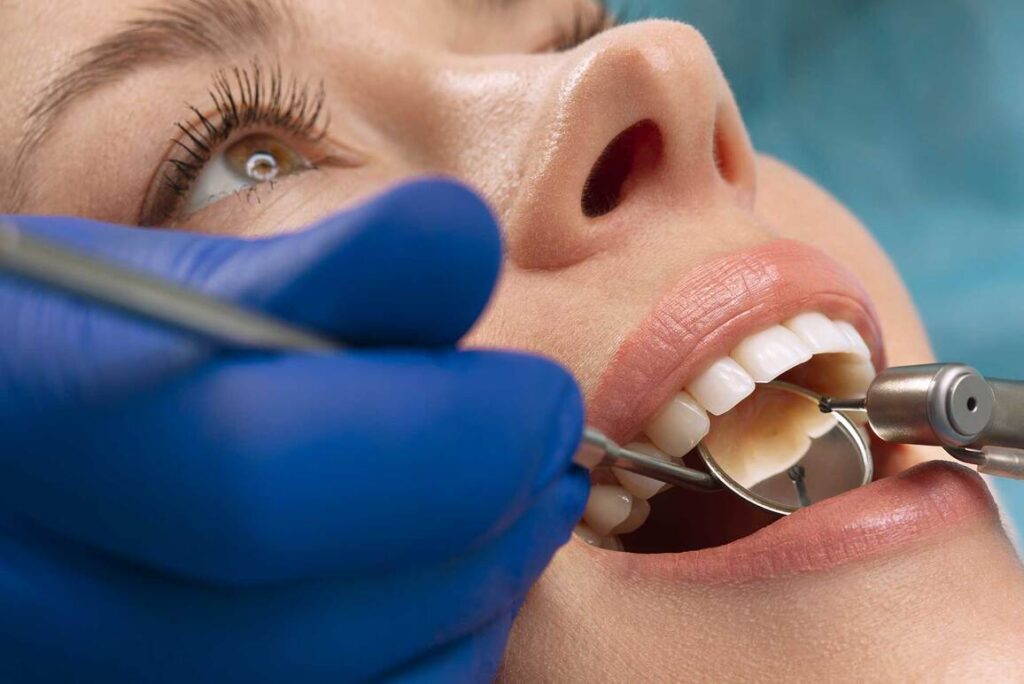For many years there have been quite many researches on the relationship between diabetes and oral health. These researches seem to have a very strong clinical base as well. Yes…. Diabetes mellitus, if not controlled, leads to poor oral health conditions like gum disease and periodontal disease. And periodontal disease is the sixth leading complication of diabetes. Moreover, not only does diabetes affect oral health but your poor oral health condition also adds up to the worsening of your diabetes condition.
What is diabetes?
Diabetes is a serious condition in which your body does not produce enough insulin, which is a hormone required to convert sugars, starches, and other foods into energy. Insulin takes up sugar from the blood and supplies these sugars to the cells to produce energy. In diabetes, your body does not make enough insulin or fails to use insulin and this in turn does not provide the fuel required to produce energy leading to an increase in blood sugar level.
Warning signs of diabetes:
- constant thirst and hunger
- blurred vision
- dry mouth
- weight loss
- poor wound healing
- itchy, dry skin
- numbness or tingling sensation in hands and feet
What Is Periodontal Disease?
It is a bacterial infection of the gums, tissues, and bones that hold them in the jaw. you may experience tooth loss if these teeth are untreated. The main cause of periodontal disease is bacterial plaque, a sticky, colorless microbial film that constantly forms on your teeth.
Warning signs of periodontitis:
- red and swollen gums
- bleeding while brushing and flossing
- spacing between teeth
- generalized gum recession
- tenderness in gums
- pus formation in the gingival tissue
- plaque and tartar formation
- bad odor
Oral complications due to diabetes:
Some soft tissue malformations have been found to be associated with diabetes mellitus in the oral cavity. These complications involve periodontal diseases such as periodontitis and gingivitis, salivary dysfunction results in a reduction in salivary flow and a lot of changes in saliva formation, and taste dysfunction. fungal and bacterial infections have also been notified in the mouth of patients with diabetes. Besides, delayed mucosal wound healing, mucosal neuro-sensory disorders, dental caries, and tooth loss has been reported in patients with diabetes. Also, some traumatic ulcers, geographic tongue, and recurrent stomatitis are evident.
Periodontitis and diabetes:
numerous risk factors have been reported that makes a patient with diabetes more susceptible to periodontal disease. micro-flora releases toxins and initiates the inflammatory process destroying the periodontium ie, gingiva, periodontal ligament, and alveolar bone which causes the formation of the periodontal pocket. This periodontal pocket deepens and ultimately the bone
support of the tooth is lost causing mobility and eventually loss of teeth.
Salivary dysfunction:
Saliva has a major role in maintaining a healthy oral condition. Many studies have found that symptoms of reduced salivary flow rate and xerostomia were more frequently reported by patients with diabetes than the controls, especially by those
diabetics who had developed neuropathy. The constant dryness of the mouth would irritate the oral soft tissues, which in turn will cause inflammation and pain. Patients having diabetes with xerostomia are more willing to periodontal disease
Taste dysfunction:
Metabolic and endocrine diseases have been reported to be associated with taste dysfunction. Which diabetes is an endocrine disease. Dryness of the mouth also causes taste dysfunction and an increase in the detection threshold. Patients with uncontrolled glycemic control have been shown to have improper taste analysis, especially patients with diabetic neuropathy.
Fungal infection:
Oral candidiasis is an opportunistic infection caused due to an imbalance in the symbiotic nature of oral flora. This is seen in diabetic patients because of predisposing factors such as smoking, xerostomia, etc. Pseudomembranous candidiasis which is often known as oral thrush is seen in diabetic patients. A white sticky patch which when wiped leaves a red and erythematous lesion is often seen in chronic immune-compromised patients. Candidal infection is commonly found in more common in patients with diabetes especially in those patients who smoke, wear dentures.
Bacterial infections:
Because of impaired immune mechanisms, bacterial infections are often seen in diabetic patients. Due to poor metabolic control diabetic patients are more prone to spreading and recurrent bacterial infection.
Oral mucosal diseases:
Lichen planus and recurrent aphthous stomatitis have been seen in diabetic patients. Patients with diabetes are subjected to a prolonged state of chronic immune suppression, especially in type 1 diabetes. In addition, acute hyperglycemia causes an alteration in the immune responsiveness in diabetes mellitus.
Neuro-Sensory Oral Disorder:
Burning mouth syndrome (BMS) and oral dysesthesia is a painful condition that causes dryness and burning sensation in the palate, tongue, throat, and gingiva. In diabetes mellitus, diabetic neuropathy can be the underlying cause of BMS, associated with immune disturbances.
Dental caries:
The increased glucose level in saliva causes a more bacterial attack on the tooth surface. Hence more acid is formed causing demineralization of the tooth structure and ultimately leading to tooth decay. Also because of xerostomia in the diabetic patient, the cleansing and buffering capacity of saliva decrease causing dental caries and tooth loss.
Tips for diabetic patients to follow for good oral health:
- Control your blood sugar levels.
- Have a healthy lifestyle and a healthy diet.
- Perform regular exercise.
- Quit smoking or any other adverse habits.
- Maintain good oral hygiene.
- Regularly visit your dentist for check-ups.
- Look for early signs of gum disease.
- Let your dentist know about your diabetic condition.
- If you wear a denture, clean it each time after consuming food.
Visit your nearest dentist, for more information
Pathak Dental Clinic
11/11 Akurdi Chikhli Road, Near Dwarka Collection, Kasturi market, Sambhaji Nagar, Thermax Chowk, Below Nutan Jewellers, Chinchwad, Pune,



